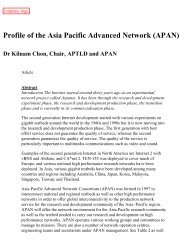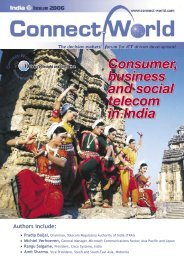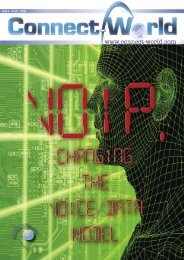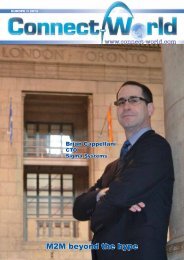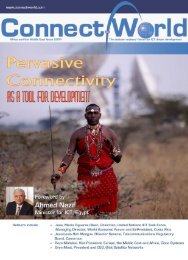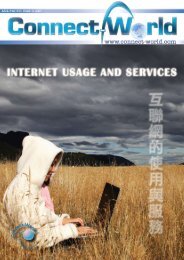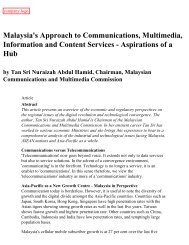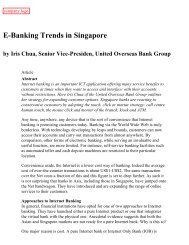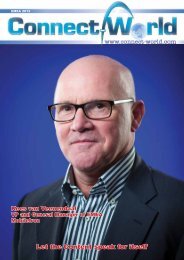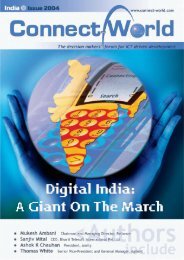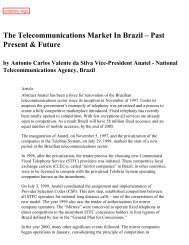Contents - Connect-World
Contents - Connect-World
Contents - Connect-World
Create successful ePaper yourself
Turn your PDF publications into a flip-book with our unique Google optimized e-Paper software.
National Development<br />
digital divide, based on the principles<br />
of availability, accessibility and<br />
affordability.<br />
Those living in the rural areas are far<br />
less likely to own computers, use the<br />
Internet or take advantage of new<br />
technologies than those who reside in<br />
urban areas. As a result, the outreach<br />
of the digital age is proceeding<br />
unevenly with the gap widening with<br />
time. This digital exclusion can have<br />
serious economic consequences for<br />
those who live in rural areas. The government<br />
is undertaking a variety of<br />
initiatives to bridge the digital divide<br />
between the urban and rural areas,<br />
among them are Universal Service<br />
Programme (USP), the One Home<br />
One PC Project and the Rural Internet<br />
Programme.<br />
Universal Service Programme (USP)<br />
was introduced with funds from both<br />
the government and the industry to<br />
help increase coverage of physical<br />
access. By providing network services,<br />
USP will give people individual and<br />
collective access to information and to<br />
the tools for knowledge building, to<br />
develop their potential and that of the<br />
nation.<br />
Equitable access and balanced development<br />
of urban and rural areas will<br />
help bridge the gap between the information<br />
rich and information poor.<br />
The government and local telecommunications<br />
service providers jointly<br />
fund USP.<br />
The One Home One PC Project was<br />
initiated in March 2004 by the government<br />
in collaboration with<br />
Association of the Computer and<br />
Multimedia Industry of Malaysia<br />
(PIKOM). It is designed to increase<br />
PC and Internet penetration as well as<br />
digital literacy amongst the Malaysian<br />
society.<br />
The Rural Internet Programme, in<br />
partnership with the postal organisation,<br />
Pos Malaysia and the local community,<br />
aims at bringing technology<br />
and ICT closer to rural communities.<br />
To date, 42 Centres located at Post<br />
Offices have been established nationwide.<br />
The Programme focuses on youth,<br />
women and senior citizens. The programme<br />
was conceived to provide a<br />
one-stop centre for e-government<br />
(G2C and G2B), e-learning, knowledge<br />
exchange, on-line examination<br />
centre, e-community, e-certification<br />
centre and centre for application<br />
development with shared resources.<br />
Profit orientation versus<br />
social obligation<br />
There needs to be a balance between a<br />
service providers priorities of producing<br />
profit and its responsibilities<br />
towards society. To this end, service<br />
provider activities need to be aligned<br />
to national development objectives.<br />
The communications and multimedia<br />
sector enables other industries and<br />
therefore contributes directly and<br />
indirectly to Malaysias gross national<br />
product. Hence, where market forces<br />
and competition govern private sector<br />
participation, the government can act<br />
to mandate the rollout of services to<br />
underserved populations where<br />
necessary.<br />
Content development<br />
“Pervasive connectivity<br />
is needed to bring the<br />
Internet to everyone so<br />
that knowledge and<br />
information prevail in<br />
every facet of our daily<br />
lives.”<br />
The promotion of creative content<br />
development is in line with the countrys<br />
vision to be a global ICT and multimedia<br />
hub. The fast growth of networked<br />
communications will intensify<br />
the demand and growth of contentbased<br />
services and vice versa. The<br />
MSC flagship applications provide a<br />
platform for the development of multimedia<br />
capability, spearheading<br />
growth in the content industries in<br />
areas such as e-Learning, e-<br />
Community, e-Public services, e-<br />
Economy and e-Sovereignty.<br />
Whilst contents for underserved communities<br />
such as minority ethnic<br />
groups as well as for the disabled are<br />
still lacking due to high development<br />
costs, various ministries and agencies<br />
in the country are collaborating in<br />
pursuing this agenda.<br />
Development of human capital<br />
and productive labour<br />
force<br />
Government policies need be constantly<br />
tuned to the development of<br />
knowledge workers and highly skilled<br />
workers to drive a knowledge economy.<br />
The government has introduced<br />
incentives and measures to advance<br />
ICT skills, for example 3D animation<br />
and various skills development programmes<br />
and vocational and technical<br />
training institutions for youths. The<br />
government provides tax rebates to<br />
spur PC ownership and encourage<br />
individual ICT usage.<br />
Malaysia has low wages, and relatively<br />
high literacy rates and language skills<br />
advantages when vying to provide<br />
online information processing for<br />
multinational corporations. However,<br />
we risk losing this advantage if our<br />
ICT and communications industries<br />
are not up to speed.<br />
Teleworking is an important use of<br />
ICT; it provides a way to capitalise<br />
untapped ‘human resources. The<br />
externalisation and delocalisation of<br />
employment and work, made possible<br />
by electronic connectedness, permits<br />
formerly isolated segments of the society<br />
to join the workforce. Teleworking<br />
lets homemakers raising children,<br />
many well educated, to work from<br />
home. Malaysian women, reportedly,<br />
comprise 36 per cent of the countrys<br />
Internet users. Similarly, disabled<br />
individuals can now work from home<br />
or create home-based businesses.<br />
Conclusion<br />
ICT enables the equitable distribution<br />
and dissemination of knowledge and<br />
information. Pervasive connectivity is<br />
needed to bring the Internet to everyone<br />
so that knowledge and information<br />
prevail in every facet of our daily<br />
lives. To achieve this, government,<br />
private sector and citizens alike need<br />
to act individually and collectively to<br />
make a Malaysian information society<br />
a reality.<br />
Tremendous opportunities lie ahead,<br />
but high-speed connectivity will be<br />
needed to reap the benefits of the<br />
advanced technologies and applications<br />
required to compete regionally<br />
and globally.<br />
The urgency of high-speed Internet<br />
deployment cannot be emphasised<br />
sufficiently. Communications service<br />
providers must meet their social obligations<br />
and help fulfil the national<br />
goal of building a connected information<br />
society and a knowledge-based<br />
economy to face the challenges of this<br />
era. <br />
13



